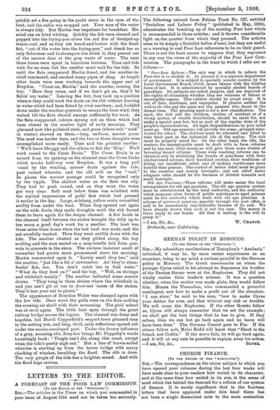LETTERS TO THE EDITOR.
A FORECAST OF THE POOR LAW COMMISSION.
• [TO THE EDITOR OH THE " SPECTATOR."] SIR,—The articles in the Times on which you commented in your issue of August 15th need not be taken too seriously. The following extract from Fabian Tract No. 127,• entitled "Socialism and Labour Policy" (published in May, 1906), adumbrates the breaking up of the existing Poor Law which is recommended in those articles ; and it throws considerable light on the quarter from which they proceed. The articles seem to be simply a Socialist ballon d'essai, but they are useful as a warning to real Poor Law reformers to be on their guard. There is not the least reason to suppose that they represent in any way the views of the majority of the Poor Law Com- mission. The paragraphs in the tract to which I refer are as follows :— " Poor-Law Reform.—The only way in which to reform the Poor-law is to abolish it. At present it is a separate department of government. It is subject to specially minute control by the Local Government Board, which issues ukases with the binding force of law. It is administered by specially elected boards of guardians. Its subjects are called paupers, and are deprived of the rights of citizenship whether they are veterans of labour or incorrigible rogues. This rubbish should be swept away. It is out of date, irrational, and unpopular. It pleases neither the well-to-do who pay the piper nor the paupers who dance to the dismal tune. The pressing need is for a new classification. The aged, the sick and the children, victims of accident or of a wrong system of wealth distribution, should be cared for, not under a special poor law, but as part of the regular duty of the people's representatives. All legal disqualifications by poor relief must go. Old age pensions will provide for some; grouped alms- houses for others. The children must be educated and fitted to take their part in the industrial life of the nation. The sick must be properly cared for. On the other hand, the idle, the wasters, the unemployable must be dealt with in farm colonies and by any such other means as will give them some chance of becoming decent citizens. These wide reaching reforms can be obtained only by abolishing the boards of guardians with their old-fashioned notions, their fossilized routine, their traditions of doling out insufficient relief, and of making workhouses more hateful than prisons. The control of indoor relief must be given to the counties and county boroughs; and out relief under adequate rules should be the business of district councils and small boroughs.
Old Age Pensions.—These reforms will make easier the local arrangements for old age pensions. The old age pension system must be. administered by the local authority, and the authority which manages other forms of public assistance to aged persons must be the authority which deals with old age pensions. A scheme of universal pensions, payable through the post office, is said to be immediately impracticable, because of its cost. We have already shown that such is not the case. The money is there ready to our hands. All that is lacking is the will to grasp it."
Orchards, near Godalining.






































 Previous page
Previous page